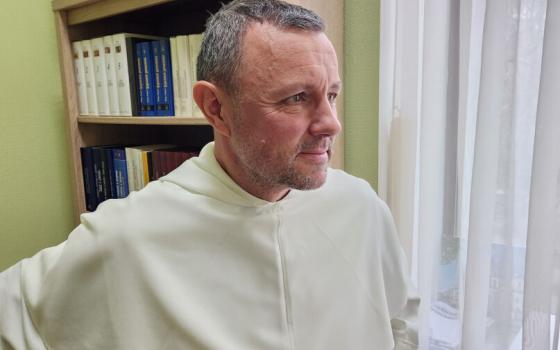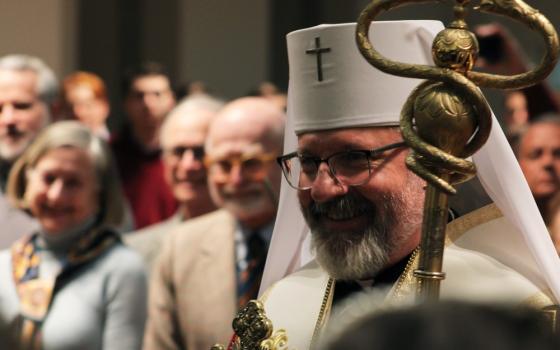By JOHN L. ALLEN JR.
Rome
While emphasizing that the primary purpose of the Oct. 10-24 Synod of Bishops for the Middle East is pastoral, Pope Benedict XVI yesterday sketched a vision of “harmonious development” for the region that the Italian newspaper Corriere della Sera summarized as “positive secularism” – premised on justice, peace, and respect for the human rights of all peoples and religions.
The pontiff spoke in the context of a homily for the synod’s opening Mass in St. Peter’s Basilica. The working calendar begins today with the table-setting speech “before the discussion” by the synod’s relator, or general secretary, Patriarch Antonios Naguib of the Egyptian Coptic church.
| Read NCR's full coverage of the Synod of Bishops for the Middle East: Index of stories from the Synod. |
“Living in a dignified manner in one’s own country is above all a fundamental human right,” the pope told participants in the synod, including more than 100 bishops from the six Catholic churches of the region: Armenian, Chaldean, Coptic, Maronite, Melkite, and Syrian, as well as the Latin Rite.
Toward that end, Benedict called upon the international community to promote “a stable path, loyal and constructive, towards peace.”
The pope also called upon the “most prevalent” religions of the region to defend “the spiritual and cultural values that unite men and exclude any expression of violence.”
That line seemed in part a criticism of religious intolerance, which often characterizes the politics of the Middle East, and a call for what Benedict XVI has often described as “healthy secularism” – recognizing the rule of law and human rights, including religious freedom, and the legitimate autonomy of politics from direct religious control.
Benedict called upon the Christians of the Middle East, estimated to be around five percent of a population in excess of 300 million, not only to promote justice and peace but also to live lives based upon the Beatitudes, including “forgiveness and reconciliation.”
The pope pledged that the Christians of the area “will always have the support of the entire church.”
The Catholic bishops of the region had asked the pope to convoke this special edition of the Synod of Bishops partly in hopes to stemming the tide of a strong out-migration from the Middle East, which some analysts have termed a Christian “exodus.” Though today five percent, Christians were estimated to represent almost twenty percent of the population of the Middle East just a century ago.
The pope referred to the “often difficult and tormented events” of the Middle East which have induced this exodus, while giving thanks for the “continuity in the presence of Christians” since the time of Christianity’s founding more than two millennia ago.
While God’s plan for salvation is universal and goes beyond history, Benedict said, it was expressed through Christ within specific “coordinates of space and time,” thus investing the Middle East, and especially the Holy Land, with unique significance.
Benedict referred to the region as “the ‘cradle’ of a universal design of salvation in love,” saying that he hopes believers there will feel the “joy” and the “great privilege” of being able “to live and bear witness in the land of Jesus.”
Benedict called upon the Christians of the area to be the “living stones of the Church in the Middle East.”
The pope included a strong call for unity in his opening remarks, beginning with unity among the sometimes fractious branches of the Catholic church in the Middle East, and then opening into dialogue with other Christian churches and other religions, especially Judaism and Islam.
The pope ended on a note of hope.
“In Jerusalem the first Christians were few. Nobody could have imagined what was going to take place,” he said, hinting at the possibility of a new “Pentecost moment” for what is arguably today the most embattled Christian community on earth.



